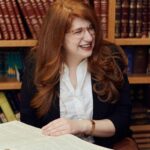“Taking a step back to envision a holy, caring society – especially in light of the oppression perpetuated by this very parasha.”
Parashat Kedoshim begins with what one might call a “greatest hits” compilation of mitzvot. Here God lists the ways in which we are to become holy: honor our parents, keep shabbat, treat our employees fairly, give away parts of our crops to those less fortunate than us, and many other obligations which often align with our modern values. Famously, we are commanded to love others as ourselves. Kedoshim offers a glimpse of what holiness might be: creating a society of caring for others.
However, amidst these beautiful mitzvot which offer structures of justice, we find prohibitions of certain sex acts. One of these prohibitions in particular has been appropriated to oppress LGBTQ+ people for millennia. Among verses which call for care, our parasha has verses which historically have caused physical, emotional, and spiritual harm — harm which continues to be perpetuated today.
It is not clear how to reconcile these challenging prohibitions with the parasha’s call for loving others as ourselves. However, the parasha presents us with the mission to be holy. If holiness is aligned with care, we are called to use that framework when figuring out how to live in accordance with this parsahsa.
Shmita is the ideal time to grapple with these challenges. When we must take a step back from physical work, we can do the spiritual work of envisioning a holy, caring, society. We have the time to ask ourselves: given the painful complexity of the history of this parasha, how might we work to end the oppression perpetuated by interpretations of this very pararsha? How might we be holy now?
 Rabbi Atara Cohen is passionate about Torah which speaks to our social, intellectual, and emotional realities. Atara teaches Judaics at The Heschel Middle School teacher and serves as the Base MNHTN Rabbinic Field fellow, welcoming young professional Jews to engage in Jewish life. She received semikha from Yeshivat Maharat and has studied Torah in a variety of settings, including Midreshet Nishmat, Hadar, Drisha and a BA in religion at Princeton University. During rabbinical school, she focused on human rights and pastoral care through various fellowships and internships. She’s a novice runner, an avid knitter, and a vegetarian recipe innovator.
Rabbi Atara Cohen is passionate about Torah which speaks to our social, intellectual, and emotional realities. Atara teaches Judaics at The Heschel Middle School teacher and serves as the Base MNHTN Rabbinic Field fellow, welcoming young professional Jews to engage in Jewish life. She received semikha from Yeshivat Maharat and has studied Torah in a variety of settings, including Midreshet Nishmat, Hadar, Drisha and a BA in religion at Princeton University. During rabbinical school, she focused on human rights and pastoral care through various fellowships and internships. She’s a novice runner, an avid knitter, and a vegetarian recipe innovator.





Comments are closed.